По всем вопросам обращайтесь на: info@litportal.ru
(©) 2003-2025.
✖
Gathering Lies
Автор
Год написания книги
2018
Настройки чтения
Размер шрифта
Высота строк
Поля
As for me, as the weeks went by I was growing more and more frustrated and less and less willing to depend on justice taking its course. Lonnie Mae might still have been alive if the system put monsters like those cops in jail, instead of either ignoring the complaints against them, or letting them out on bail. And Lonnie was by no means an isolated case. Time after time, over the years, I’d seen it happen—rapists, murderers, child molesters given light sentences, only to be released from prison and kill, rape and molest again.
That I had defended some of them became an issue that confused me, leaving me sleepless and worn. My faith in jurisprudence—my vision of what the rule of law required—was nearly gone by this time, a state of mind at least partially responsible for what happened later, at Thornberry.
So I bought a new laser printer and reams of paper. By this time I was living here at my parents’ house, and one morning I took a cup of strong, hot Fidalgo coffee to my father’s desk, sat at my computer and began. After several awkward attempts, piling up pages by the hundreds in the trash can, I found myself working twelve, fourteen, even eighteen hours a day on this, my first book, Just Rewards. It became more important than anything I’d ever done, and the obsessive drive that had seen me through law school carried me now into this new world of writing, with that “fire in the belly” writers talk about.
Then, in early March, six weeks after my arrest, Timothea’s invitation came to spend the month of April at Thornberry. I readily agreed. Except for telling her story in my book, there seemed to be nothing more I could do for Lonnie Mae at that time. The scandal in the papers about the Five had, against all my hopes, died down to a mere dribble, and I’d grown less and less certain that the DA’s office would ever charge them. A call to Ivy had confirmed that opinion. She had been clipped, impersonal. Nothing to report yet, she said. Don’t call me, I’ll call you, was implied.
So I had no one to answer to, no one to stay home for. Ian had already said goodbye, and I hadn’t heard from him since. Aside from all the Sophia, first-and-only-love crap, he had said that just knowing me now could damage his career on the force. Would I do him a favor and tell everyone we knew that we were no longer involved?
Sure I would, I said. Glad to. No problem. And screw you, too.
That night I’d lit several candles of varying sizes and shapes in my bathroom, and I’d stood before the mirror with a pair of sharp scissors and ceremoniously cut my hair. I took it down to a couple of inches above the root—like Sharon Stone’s, a friend said later—and with every cut, I excised Ian from my life.
It is May as I write these notes in my journal, and in the few short months since all that happened, I sometimes feel I’m growing into one of those women I’ve read about in books, who is older suddenly than she ever imagined she would be, and not perhaps as attractive to men as she once was. She enjoys watching romantic movies and reading sexy novels about young people, even though she knows love will probably never happen for her again. The body is going, and thus her coinage, and while that perhaps is sad, she realizes with a certain equipoise that it’s much easier now to dream about a lover than to actually deal with one.
I rise from my computer and stretch my legs, thinking back on those days while I make a pot of tea, covering it with a cozy the way my mother always did. Her cozy, her house, her pot, her tea. It seems, some days, as if I have nothing left of my own. Not that I’m ungrateful. There are worse things than having an historic old house to live in, and enough money in the bank to get by—provided my legal fees don’t eat it all up.
And isn’t that a slick little trick of karma, for you—a lawyer having to worry about billable hours.
Then there’s the book, if I ever finish it. How can I reveal what happened, now? With all of us sworn to silence, that leaves me with only a beginning and a middle—no end.
So I sit here at my father’s desk and tell my story to myself, if only to keep things straight. My mind wants to twist the events that occurred, changing them this way and that. It wants to make what happened come out in an entirely different way.
Magical thinking, some would call it. But no matter what I do, no matter what better scene I visualize, there’s no way to change things—not then, not ever.
I am under house arrest now, while the others, for the moment, at least, go free. The prosecuting attorney of San Juan County had no proof I’d committed the horror at Thornberry. Still, given the circumstances, there wasn’t much he could do but have me arrested. The sheriff locked me up, and I thought at first I might spend months in a county jail. Almost immediately, however, someone—I’ve never known who—pulled strings to get me transferred down to Seattle.
I didn’t ask for this—didn’t, in fact, want it. Nor did I want the ankle cuff that lies heavy against my skin, a constant reminder that I’m not free to leave the house, even to work on my own case. One little step outside the door, and an alarm goes off at the Probation and Parole office. I can’t even go to the store.
Instead, I await my fate in the home my parents raised me in, surrounded by photographs of myself as a solemn but innocent young girl, my father’s arm around me, his love supporting me through all the small childhood terrors.
Funny. I thought he would always be here.
There are lace curtains at the windows, and my eyes well as I remember my mother washing and ironing them, every Saturday morning of her life. Steam would rise as she stroked with her iron, back and forth, back and forth, while into the air rose the fresh, clean scent of Niagara starch. When my mother wasn’t cleaning, she was baking, and there were nights when she’d go on a tear. I would waken in the morning to find several pies, cakes and plates of cookies in the kitchen, a feast. It wasn’t until I was older that I knew why she did this—to avoid sleeping with my father.
My father was a workaholic. A big, quiet man, he sweat blood from nine in the morning till six at night to keep white-collar criminals out of jail. Lies, cover-ups, deals, scams—all were an integral part of the work he performed for Sloan and Barber, one of the most elite and respected law firms in Seattle. Nights when he managed to come home in time for dinner, my father closed himself up afterward in his study, throwing himself into even more work, in a fool’s attempt to forget the sins he’d committed that day.
So my father was gone, and I somehow felt my mother blamed me for that. Before she left for Florida, she’d cried. “All the hopes, all the dreams we had for you—dashed in one horrible moment!”
We barely spoke after that, and I only knew I was welcome to move into her house when a messenger arrived at my door with a key.
This, then, is some of the background I took with me to Thornberry, a background not so different from the other women, yet not so similar, either, as it turned out. Each of us brought strengths and weaknesses, skills and knowledge. This proved to be a blessing, as we would need them all before we were done.
It also proved to be a curse.
PART II
3
On that day in April when the Great Earthquake hit, none of us at Thornberry could possibly have guessed what lay ahead, or how it would affect every one of our lives.
I stepped out of my cottage that afternoon and lingered to drink in the view. Pausing for a moment on the small porch, I looked across fir and cedar trees to the sky above the Strait of Juan de Fuca. Here in the San Juan Islands, some eighty miles north of Seattle, the sky remained light somewhat longer than in the city. Even so, I hadn’t expected such an odd color of yellow at five in the afternoon. Nor had I expected the air to be so warm in April. It was the earliest spring in history, some said.
This was the first time I’d seen the sky like that, however. All week long clouds had hung over the islands, at least on those days when there wasn’t fog.
For long moments I gazed at the trees, my nose twitching at their sweet, woodsy scent. Primroses had popped up among the rocks that lined my path to the farmhouse road from my cottage—which was named, after Timothea’s deceased daughter, “Annie’s Rose.” Annie died from pneumonia when she was six, and Timmy had acquired a permit to have her buried on the property. A tiny cross marks the spot on a hill invisible from the farmhouse, but facing the sea.
There were only four homes on Esme Island, which was roughly oblong and three miles across from north to south. Ransford, the Ford house on the north side, was much grander than Thornberry, on the south shore. The other two homes were cabins, built in the 1950s and existing on Esme at the time Timothea and the Fords bought the island and built here. They lay to the west of Thornberry, along the shore, and were maintained by their original owners only as summer vacation homes.
This left Timothea quite isolated during the long winter months, which, I imagined, was why she’d set up a writer’s colony when the bed-and-breakfast closed. This way, she could still have year-round visitors.
She had apparently kept it manageable, however. There were only six residents’ cottages at Thornberry, each with different names and each beautifully crafted of cherry, pine, and cedar, with stained glass windows in the sleeping lofts. They dotted several acres of woodland surrounding the main house, which began as Timothea’s bed-and-breakfast all those years ago. Now called simply the “farmhouse,” it was a three-story white structure, similar in architecture to many of the lovely old homes in British Columbia. “What a romantic place,” my mother enthused the first summer we visited. “Perhaps we’ll meet our true loves here.”
She said it with that light laugh that surprised me every time it came out, as my mother was more often than not rather morose. I was ten at the time, and if I thought it odd that my mother—who had been married to my father for years—still spoke of finding her true love, I refrained from saying so.
The farmhouse now served as administrative office, kitchen, and nightly meeting place for resident writers. Timothea lived in the second-floor rooms, and two office assistants remained, weeknights, in private rooms on the third floor.
As for the cottages, none could be seen by the other. In fact, once settled in, the only sign of life nearby was a now and then wisp of smoke from the woodstoves of the other five residents. We were not permitted to speak to each other or disturb each other in any way, until four in the afternoon. This, Timmy explained, was to ensure that each of us had every opportunity to write.
Arriving at Thornberry in April, I was out on bail, my trial date set for August third. The prosecution had pushed for an earlier date, but my lawyer pushed back, pleading a full schedule. In truth, she was giving me time to finish the book. I knew there would also be the usual delays and continuances, and did not expect my trial to go forward till December, at the earliest.
Which thrilled my publisher. Though I wouldn’t turn the manuscript in until October, they planned to push Just Rewards through production virtually overnight, with a pub date of December 1. From the publisher’s point of view, it was worth the unusual effort, as the trial would help to make it a bestseller. From my lawyer’s point of view, I’d be getting it into the hands of the legal analysts—the talking heads on TV—right when it might do me the most good. They were known to come down hard, lately, on crooked cops. And since crooked cops were my best, and only, defense, I said sure, let’s pull out all the stops.
I was ready, by then, to play any angles to bend, and if necessary, beat the judicial system.
Seeing Timmy here again after so many years, I had mixed feelings. It had been two decades since I’d last been at Thornberry, and we both had changed. Timmy, though, seemed unusually strained. I mentioned this to Dana, one of the other residents, as we walked together toward the farmhouse for dinner. I’d run into her before, coming from her cottage, and we’d found it easy to talk to each other. For the most part, we talked about the other residents and how we felt about them. Gossip, I suppose—something I seldom indulged in. But at Thornberry, after the first few days of daily isolation, we were all still wondering about each other.
This night, I shifted the basket of books I’d brought with me to return to the farmhouse library, and brought up the subject of Timothea.
“I knew her a long time ago,” I said, “and she always seemed a happy person, one who knew precisely what she was doing in life. I thought she found contentment in it.”
“Well, it must be difficult dealing with five different writers a month,” Dana said. “Having to sit with us at dinner, listen to us jabber. Have you ever seen such a bunch of—” She hesitated.
I knew the word she was going for, and revised the first letter of it. “Witches?”
She laughed. “Except for Jane. She seems nice. I feel sorry for her, though. Grace just won’t let her be.”
Jane was a well-to-do young matron from Bellevue, and Grace Lopez a tough, mouthy New Yorker. Grace was thin and wiry, with short black hair, an olive complexion, and a temperament straight from the Bronx. So far, Jane hadn’t been doing very well at holding her own with her. Jane was writing a romance novel, and if there was anything Grace seemed as if she’d know nothing about, it was romance.
I myself had become bored with the kind of tensions that seemed to develop over dinner every night. Aside from Jane and Grace, there was Amelia, a seventy-two-year-old curmudgeon and prize-winning poet. She and Grace would get into something volatile, and Jane would leap in to smooth things over, then get caught in the runoff.
One member of our group that I hadn’t had time to form an opinion about was Kim Stratton, the Hollywood actress who’d suddenly found herself, with one hit movie, on a level with the best. Her succeeding films reportedly raked in more than the national debt, yet Kim had come to Thornberry to write her memoirs, she had told everyone on the one night she’d shown up for after-dinner coffee. The majority of the time she kept to herself in her cottage, and had acquired a reputation with the other women for being standoffish.
What kinds of memories this auburn-haired beauty felt impelled to be writing about at age thirty, I couldn’t imagine. Still, she was known as “America’s Sweetheart”—at least to those not old enough to remember that Mary Pickford once held that title. Presumably, enquiring minds wanted to read everything they could about Kim Stratton.
“So you think Timothea’s just bored with us all?” I asked Dana, as we continued toward the farmhouse.
She gave a shrug, and the silver-and-turquoise necklace she wore shimmered in the yellow light. Dana, from Santa Fe, was often mercifully teased by Grace for being psychic, or Santa “fey.” I knew little about her life in New Mexico, as she seldom talked about it. There was a husband, I’d learned. But the kind of person he was, and what he did for a living, seemed shrouded in mystery.









